Table of Contents
Health Benefits Of Natural Foods
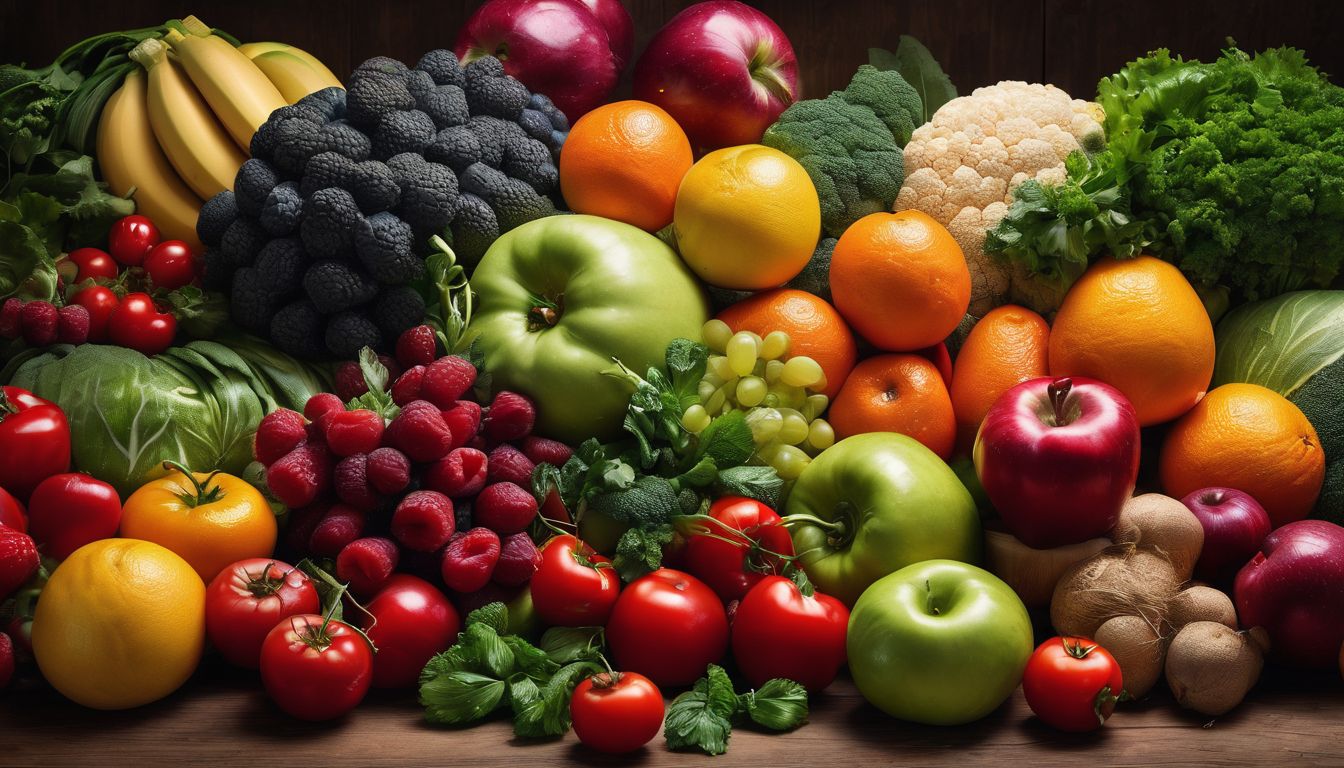
Are you tired of feeling sluggish and want to improve your overall health? Studies show that incorporating natural foods into your diet can be a game-changer. This article is packed with information about the wealth of benefits that natural foods provide, like boosting your immune system, supporting heart health, and even promoting better skin.
Read on to explore how this simple dietary change could revolutionize your well-being!
Key Takeaways
- Natural foods like fruits, vegetables, lean meats, and whole grains are packed with essential nutrients that support overall health and well-being.
- Including natural foods in your diet can help manage blood sugar levels and reduce the risk of chronic diseases such as heart disease and diabetes.
- High – fiber natural foods promote healthy digestion, weight management, and lower the risk of conditions like high blood pressure and diabetes.
- Natural foods contain antioxidants that boost the immune system, reduce inflammation, and protect against chronic diseases.
What are Natural Foods?
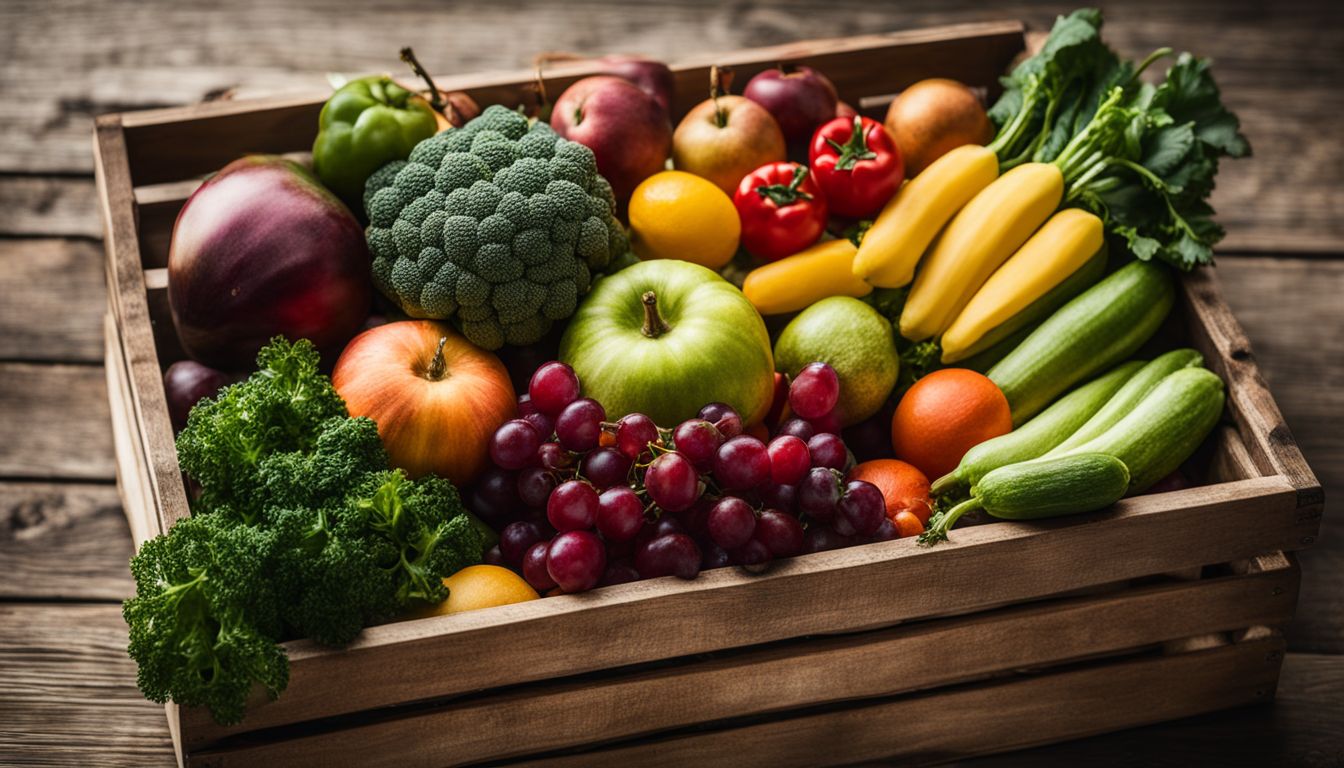
Natural foods are unprocessed animal and plant foods that are rich in vitamins and minerals, low in sugar, and free from artificial ingredients.
Unprocessed animal and plant foods
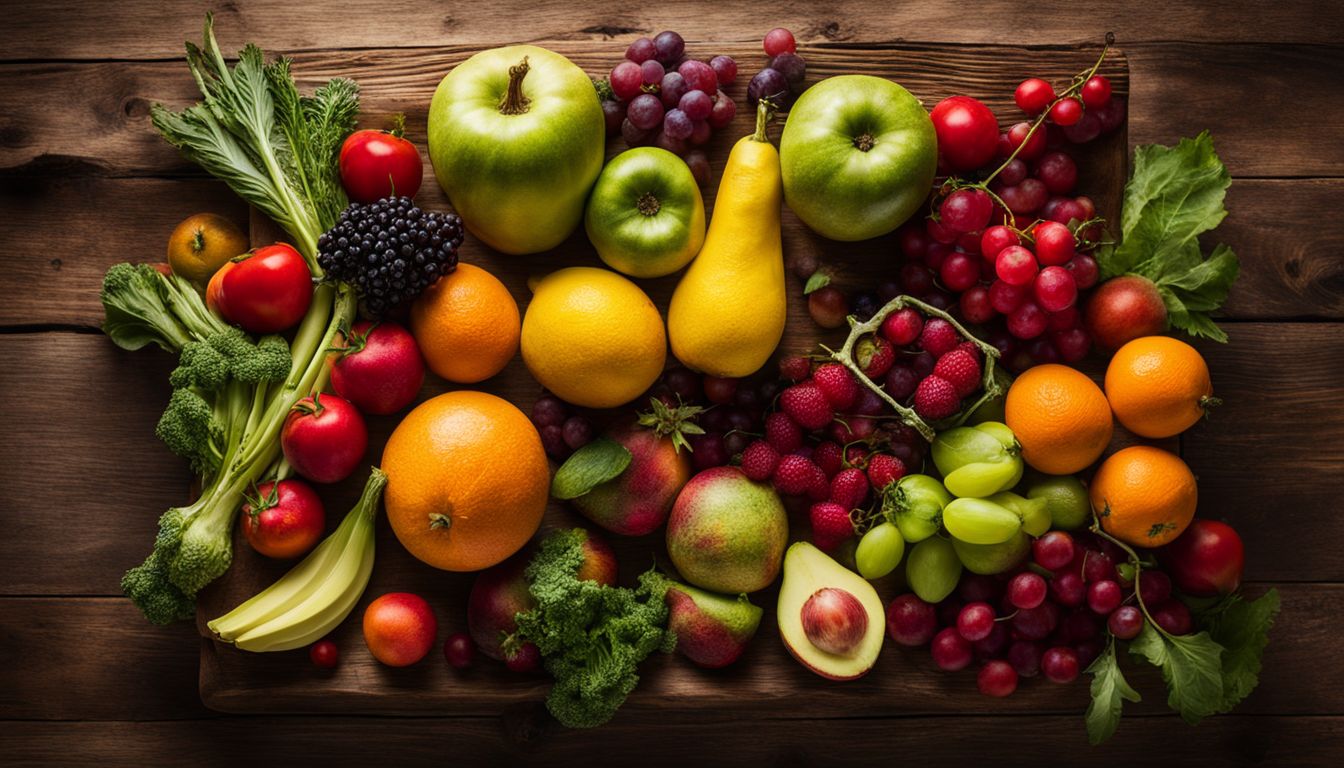
Seeds, nuts, fruits, vegetables, and lean meats fall under the category of unprocessed animal and plant foods. These nutrient-dense food items are also free from artificial ingredients or sugars.
Eating these can provide essential nutrients for optimal health as they contain higher amounts of vitamins and minerals compared to processed alternatives. Not only do these elements support overall well-being, but they also lower the risk of chronic diseases such as obesity and diabetes.
A diet rich in whole foods supports gut health too—another key factor often overlooked in maintaining a healthy lifestyle. Furthermore, those who strictly consume plant-based diets reap additional benefits by entirely excluding animal products from their meals—an excellent practice for those eager to further enhance their dietary habits.
Rich in vitamins and minerals
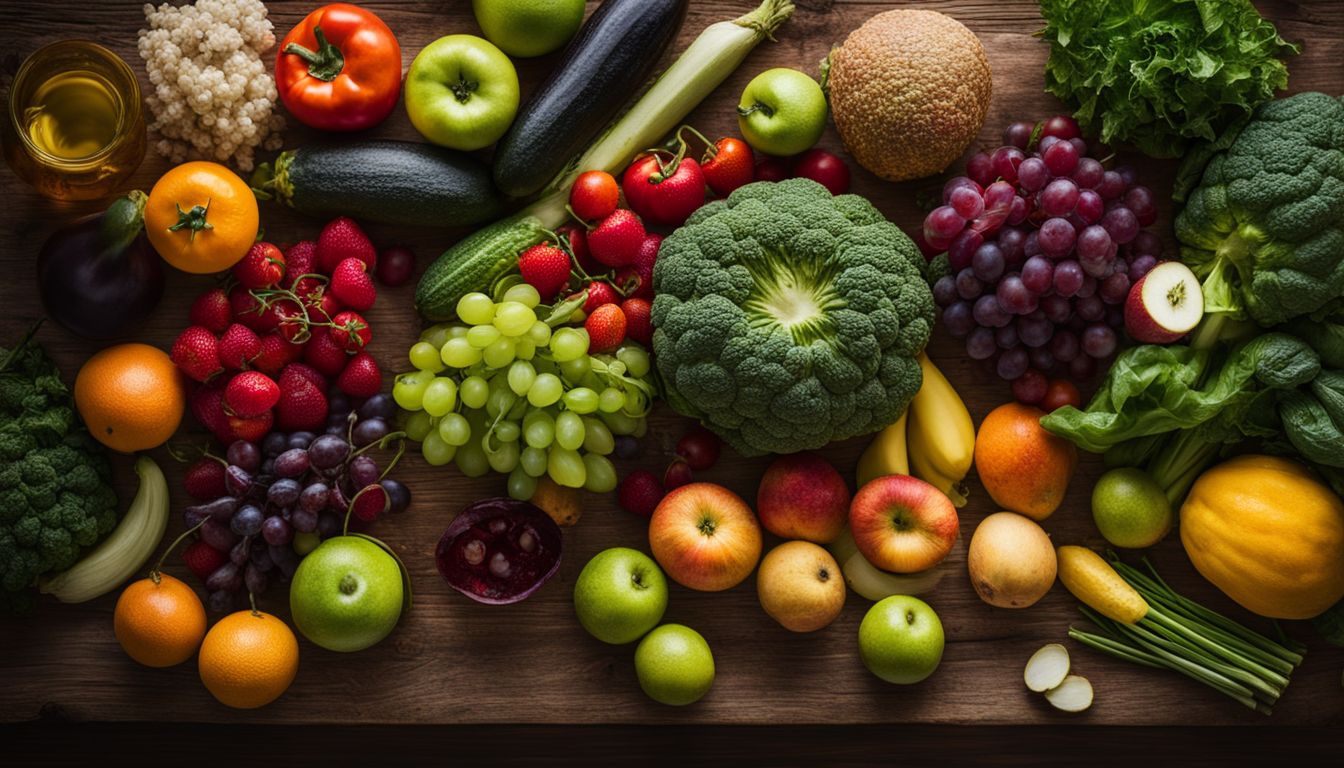
Natural foods are the powerhouse of essential vitamins and minerals. Including a variety of fruits, vegetables, lean meats, whole grains, dairy products, legumes and nuts in one’s diet can provide a vast array of these crucial elements.
Different types of natural foods contain different nutritional profiles, ensuring that a balanced diet offers a broad spectrum of nutrients to our body.
For instance, fat-soluble vitamins found abundantly in eggs, oily fish and dairy products play critical roles in the functioning of our body. Fruits may carry natural sugar but do not let this fact overshadow their numerous benefits – they also deliver dietary fiber along with an assortment of water-soluble vitamins and minerals which are vital for overall health.
Naturally derived food items like cacao butter and virgin olive oil lend themselves generously as excellent sources for several rich nutrients too. Hence incorporating such foods regularly contributes greatly towards enhancing our physical well-being due to their dense nutritional content.
Low in sugar

Natural foods such as apples, bananas, and low-fat milk punch above their weight when it comes to health benefits. They’re supercharged with vitamins and minerals but stay low in sugar content.
This is a win-win situation for those conscious about their sugar intake. Unlike added sugars that can lead to harmful effects on the body, these foods contain natural sugars considered beneficial additions to a balanced diet.
Fresh fruits are not just sweet treats; they are also powerhouses of naturally occurring sugars critical for optimal health. With each bite of these nutrient-rich offerings from nature, you get lower calories, minimal sodium, high water content along with essential vitamins and minerals — quite the contrast against processed food high in artificial ingredients or refined sugar! So whether it’s your morning yogurt topped with blueberries or an afternoon snack of crisp apple slices smeared with natural peanut butter – you’re not only keeping your taste buds happy but promoting better health by choosing foods inherently low in sugar!
No artificial ingredients

Natural foods are free from any artificial ingredients, such as synthetic additives or chemical additives. These types of ingredients are often found in processed foods and have been linked to serious health concerns like ADHD and cancer.
When you choose natural foods, you can be confident that what you’re eating is pure and free from harmful substances. The term “natural” on food labels means that the product does not contain any artificial colors, flavors, or additives.
It’s important to read food labels carefully to ensure you’re making choices that support your overall well-being.
Nutritional Benefits of Natural Foods

Natural foods provide important nutrients, high fiber content, antioxidants, and support heart health. They can also help manage blood sugar levels, promote healthy skin and dental health, reduce disease risk, and support gut health.
Read more to discover the numerous benefits of incorporating natural foods into your diet.
Provides important nutrients

Natural foods are a valuable source of important nutrients that our bodies need to function properly. These foods are packed with vitamins, minerals, and antioxidants that support overall health and well-being.
By incorporating natural foods into your diet, you can ensure that you are getting the essential nutrients your body needs to stay strong and healthy. Some examples of natural foods that provide important nutrients include fruits, vegetables, whole grains, lean meats, fish, nuts, seeds, and legumes.
These nutrient-rich foods help strengthen the immune system and promote optimal functioning of various organs in the body.
Eating natural foods also helps prevent deficiencies in key nutrients which can weaken the immune system. For instance, bananas, cantaloupe, raisins, nuts, fish like salmon or tuna packed with omega-3 fatty acids DHA/EPA (docosahexaenoic acid/eicosapentaenoic acid), spinach enriched with iron and other dark greens are rich in potassium which plays a vital role in maintaining proper electrolyte balance within cells – an imbalance may lead to muscle cramps or irregular heartbeat – as well as supporting heart health by helping lower blood pressure levels naturally; while leafy green vegetables contain folate (vitamin B9) needed for red blood cell production; citrus fruits loaded with vitamin C boost immunity; yogurt is rich in probiotics promoting gut health; eggs offer protein for muscle growth/repair.
High in fiber
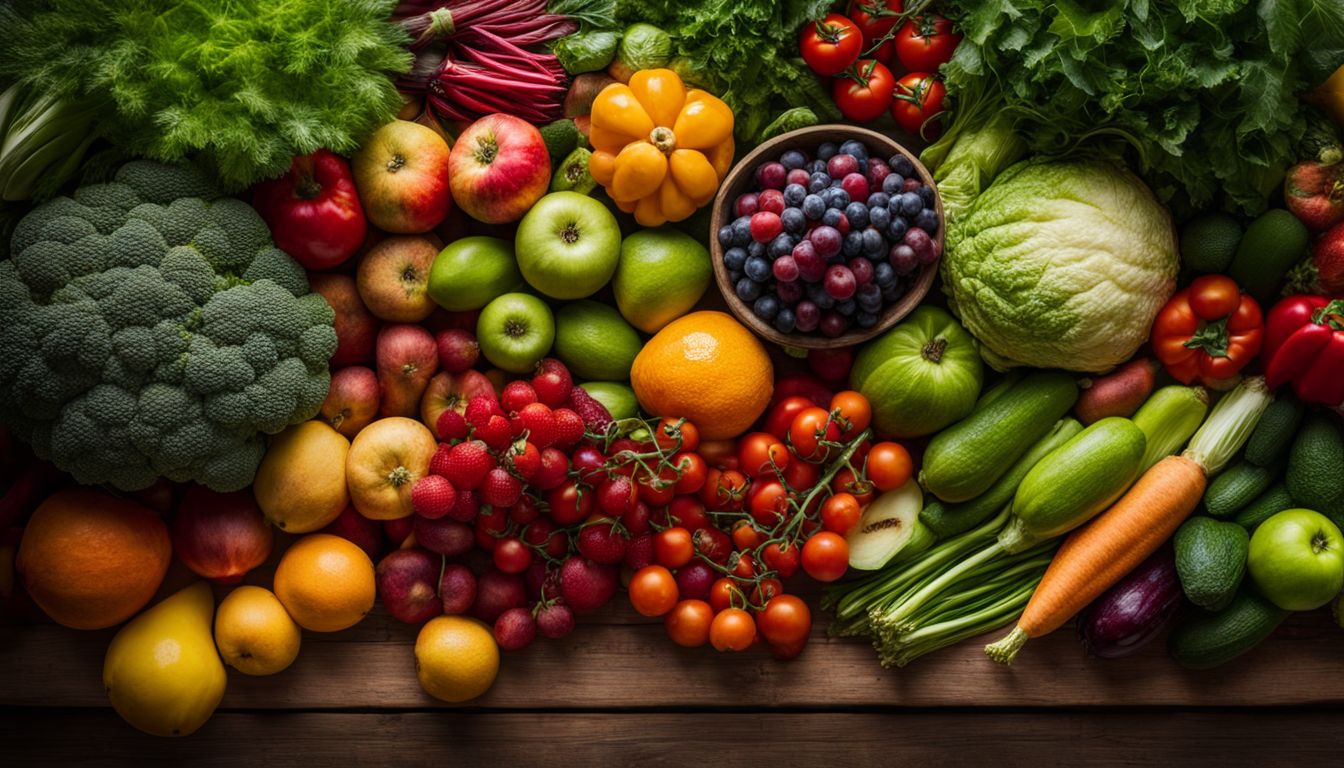 High-fiber natural foods, such as oatmeal, chia seeds, nuts, beans, lentils, apples, and blueberries provide important nutritional benefits and contribute to overall health. Soluble fiber found in these foods can help improve blood pressure levels and regulate cholesterol.
High-fiber natural foods, such as oatmeal, chia seeds, nuts, beans, lentils, apples, and blueberries provide important nutritional benefits and contribute to overall health. Soluble fiber found in these foods can help improve blood pressure levels and regulate cholesterol.
It can also aid in weight loss by promoting feelings of fullness and reducing calorie intake. Additionally, a high-fiber diet reduces the risk of diabetes by improving blood sugar control.
Fruits and vegetables are excellent sources of soluble fiber, while cereals and whole-grain products provide insoluble fiber that supports healthy digestion. Including these fiber-rich foods in your daily diet can lead to a healthier gut and make it easier to maintain a healthy weight.
Contains antioxidants

Antioxidants are essential for maintaining good health. They help protect our bodies from harmful free radicals, which can cause damage to cells and contribute to chronic diseases like cancer and heart disease.
Natural foods are a great source of antioxidants, especially plant-based foods like fruits, vegetables, and grains. These foods contain vitamins A, C, and E, as well as minerals like copper, zinc, and selenium that act as powerful antioxidants in the body.
By incorporating natural foods into your diet that are rich in antioxidants, you can boost your immune system, reduce inflammation, support heart health, and lower disease risk. So next time you’re planning your meals or snacks; remember to choose natural foods that contain beneficial antioxidants for optimal health.
Supports heart health

A diet that supports heart health can reduce the risk of heart disease. Foods such as leafy greens, whole grains, and fatty fish are beneficial for the heart. These foods are rich in nutrients like fiber and antioxidants that promote a healthy cardiovascular system.
Incorporating these heart-healthy foods into your diet can help lower cholesterol levels and maintain a healthy weight, reducing the risk of heart problems in the long run. By choosing natural foods that support heart health, you are taking an important step towards maintaining a strong and healthy heart.
Helps manage blood sugar
Including natural foods in your diet can play a significant role in managing blood sugar levels. Certain foods, like oats and oat bran, are high in soluble fiber, which helps improve blood glucose control.
Additionally, apples, bananas, and oranges are also rich in soluble fiber and can assist in stabilizing blood sugar levels. Dark chocolate, when consumed in moderation, has been found to be beneficial for controlling blood sugar as well.
By incorporating these natural food options into your meals and snacks, you can better manage your blood glucose levels and support overall health.
The high fiber content found in natural foods can slow down the absorption of carbohydrates into the bloodstream. This helps prevent spikes in blood sugar levels after eating. Furthermore, including foods that are low on the glycemic index (GI) – such as legumes and leafy greens – can also aid in maintaining steady blood glucose levels throughout the day.
Good for skin health
Citrus fruits like oranges, grapefruits, and berries are packed with essential nutrients and antioxidants that can do wonders for your skin health. These fruits contain high levels of vitamin C, which helps to fight wrinkles and improve the overall appearance of your skin.
Additionally, foods rich in omega-3 fatty acids like salmon and avocados can promote healthy and glowing skin. Don’t forget about the power of seeds and nuts like almonds, sunflower seeds, and peanuts – they are a great source of vitamin E that contribute to supple and nourished skin.
Including these natural foods in your diet can help you achieve a radiant complexion and maintain good skin health.
Promotes dental health
Foods that promote dental health are essential for maintaining strong and healthy teeth. Certain foods contain nutrients like vitamin C, calcium, and keratins that help clean teeth and keep them free of plaque.
For example, carrots provide important vitamins and minerals that support oral health. Consuming dairy products such as cheese, milk, and plain yogurt can also be beneficial due to their calcium content.
Additionally, fiber-rich fruits and vegetables not only benefit overall health but can also help keep teeth and gums clean. Apples are a great example as they contain xylitol, which is known to have oral health benefits.
May reduce disease risk
Consuming natural foods may help reduce the risk of developing certain diseases. A healthy diet rich in fruits, vegetables, whole grains, and low-fat dairy can lower the risk of heart disease by maintaining blood pressure levels.
Additionally, including natural foods in your diet can also reduce the risk of stroke and certain types of cancer. Natural foods are packed with dietary fiber which has been shown to protect against metabolic and fatty liver diseases.
So, choosing natural foods as part of your diet can have a positive impact on your overall health and well-being by reducing the risk of various diseases.
Supports gut health
Natural foods play a crucial role in supporting gut health. The gut microbiome, composed of trillions of bacteria and other microorganisms, plays a vital role in maintaining overall health.
Low microbiota diversity has been linked to chronic inflammatory diseases such as obesity, diabetes, and IBD. Including natural foods in your diet helps promote the growth of beneficial bacteria in the gut, leading to a healthier and more diverse microbiome.
Fruits and vegetables are particularly beneficial for gut health due to their high fiber content and abundance of nutrients that nourish the gut microbiota. Additionally, fermented foods like sauerkraut, kimchi, miso, and yogurt provide probiotics – live beneficial bacteria that support digestive function.
Health Benefits of Eating Natural Foods

Eating natural foods provides numerous health benefits, such as being more nutritious, helping lower cholesterol, supporting a healthy weight, and being a convenient and safe choice for allergies or intolerances.
More nutritious
Natural foods are known to be more nutritious compared to processed foods that contain artificial ingredients. They are packed with essential vitamins and minerals that our bodies need for optimal health.
These nutrient-dense foods provide us with important nutrients, high amounts of fiber, and beneficial antioxidants that support heart health, manage blood sugar levels, promote healthy skin, and may even reduce the risk of chronic diseases.
By choosing natural foods over processed ones, we can ensure that we are fueling our bodies with the best possible nutrition for overall well-being.
Tastes better
Natural foods have the added advantage of tasting better than highly processed junk foods. Take strawberries as an example – their juicy and delicious flavor is hard to beat! In fact, the taste of sweet and salty foods often indicates that they are nutrient-rich.
So not only can you enjoy a satisfying meal, but you’ll also be nourishing your body with wholesome flavors. By choosing natural foods, you’re treating your taste buds to a more enjoyable experience while making healthier choices for your overall well-being.
Helps lower cholesterol
Certain foods can play a role in lowering cholesterol levels and promoting heart health. For example, beans, oats, whole grains, fatty fish, and fruits and vegetables high in fiber are known to help lower “bad” LDL cholesterol.
Polyunsaturated oils like sunflower or safflower oil, as well as oats and nuts, may also have a positive impact on cholesterol levels. Olive oil is another great option that can help improve blood cholesterol.
On the flip side, it’s important to be mindful of saturated fat and trans fat found in foods like fried items or processed snacks as these can raise “bad” cholesterol levels. Including specific foods such as oatmeal, oat bran, almonds, and chia seeds in your diet might naturally assist in lowering cholesterol levels.
Supports a healthy weight
Eating natural foods supports achieving and maintaining a healthy weight. Certain types of nutrients and specific food groups, like whole grains, vegetables, fruits, and nuts, can actually help with weight control.
Including lean protein and legumes in your diet also promotes overall health while managing your weight. By choosing natural foods that are nutrient-dense and low in added sugars, you can support your body’s ability to maintain a healthy weight.
So go ahead and load up on those fresh fruits and veggies!
Can be more affordable
Eating natural foods can be a more affordable option for maintaining a healthy diet. A study conducted by the U.S. Department of Agriculture (USDA) found that consuming nutritious, unprocessed foods is often less expensive than relying on processed and convenience foods.
This means that you can nourish your body with essential vitamins and minerals without breaking the bank. By opting for whole foods like fruits, vegetables, lean proteins, and whole grains, you can improve your overall health while saving money in the long run.
So why not choose natural foods that are not only good for your body but also kind to your wallet?.
Convenient
Convenient: Eating natural foods can provide a more convenient option compared to processed foods. With the availability of pre-cut fruits and vegetables, packaged nuts and seeds, and healthy snack bars made from natural ingredients, it’s easy to grab a nutritious bite on the go.
Plus, many supermarkets now offer an array of organic products and whole food options that are conveniently located in one section. So whether you’re looking for a quick snack or planning your next meal, choosing natural foods can save you time without compromising your health.
Safe choice for allergies/intolerances
Natural foods can be a safe choice for individuals with allergies and intolerances. When consuming natural foods, it is easier to control and avoid triggering ingredients that may cause adverse reactions.
People with food allergies may potentially have reactions to related foods, so opting for unprocessed animal and plant foods can help minimize the risk of allergic responses. While there is no cure for food allergies, natural treatments and supplements can help reduce symptoms.
It’s important to differentiate between food allergies and other unpleasant reactions to food in order to make informed choices about what we eat.
Good for the environment
Choosing natural foods is not only beneficial for our health but also for the environment. By opting for unprocessed animal and plant foods, we contribute to sustainable farming practices and reduce the carbon footprint caused by industrial food production.
Natural foods are often grown using organic methods, which means they are free from harmful pesticides that can harm ecosystems and pollute water sources. Additionally, supporting local farmers who prioritize sustainable agriculture helps preserve biodiversity and reduces the need for long-distance transportation of produce, thereby lowering greenhouse gas emissions.
Making conscious choices when it comes to our food not only nourishes our bodies but also plays a significant role in promoting environmental sustainability.
The Importance of Food Choices

Making conscious and informed food choices is crucial for maintaining good health and overall well-being.
Making the right food choices
Choosing the right foods is crucial for maintaining good health. By opting for natural and unprocessed foods, we can ensure that our bodies receive the necessary nutrients they need to function properly.
These types of foods are rich in vitamins, minerals, and fiber, and low in sugar and artificial ingredients. They also provide antioxidants that support heart health, help manage blood sugar levels, promote healthy skin and teeth, reduce disease risk, and support gut health.
Making the right food choices empowers us to take control of our well-being and improve our overall quality of life.
Antioxidants for good health
Antioxidants play a crucial role in supporting good health. These powerful substances found in many natural foods help protect our bodies from the harmful effects of unstable molecules called free radicals.
Free radicals can damage cells and contribute to various chronic diseases, such as heart disease, cancer, and diabetes. By neutralizing these free radicals, antioxidants help reduce the risk of developing these conditions.
That’s why it’s important to include antioxidant-rich fruits, vegetables, and legumes in our diet to support overall health and well-being.
Including natural foods that are high in antioxidants can provide numerous benefits for our bodies. Not only do they help fight against oxidative stress caused by free radicals, but they also promote healthy aging, boost immune system function, and support optimal brain health.
Some examples of antioxidant-rich foods include berries (such as blueberries and strawberries), leafy greens (like spinach and kale), nuts (such as almonds and walnuts), and dark chocolate.
The Benefits of Organic Foods

Organic foods provide safer and more nutritious options, reducing exposure to toxins.
Safer and more nutritious
Organic foods are a safer and more nutritious option compared to conventionally grown foods. They are produced without the use of synthetic pesticides, antibiotics, hormones, or genetically modified organisms (GMOs).
This reduces our exposure to harmful chemicals and promotes better overall health. Additionally, organic products often contain higher levels of beneficial nutrients such as antioxidants, vitamins, and minerals.
Studies have shown that organic crops have increased amounts of antioxidants compared to their conventionally grown counterparts. So choosing organic can help us ensure that we are consuming food that is not only safer but also packed with essential nutrients for optimal well-being.
Reduces exposure to toxins
Organic foods, such as fruits, vegetables, and grains, can help reduce our exposure to toxins. Unlike conventionally grown crops that are treated with pesticides and insecticides, organic produce is grown without the use of these harmful chemicals.
In addition, organic farming practices avoid the use of synthetic fertilizers and genetically modified organisms (GMOs) which further reduces exposure to toxins. By choosing organic foods, we can minimize our intake of artificial chemicals and lower the risk of potential health issues associated with prolonged exposure to these toxins.
Real Food Swaps for Healthier Snacking

Try swapping out sugary snacks with healthier alternatives such as fresh fruit, nuts, or veggie sticks for a nutritious and satisfying snack.
Zero refined sugar
Avoiding refined sugar can have significant health benefits. Refined sugar is linked to serious diseases like diabetes and obesity, so eliminating it from your diet can help reduce the risk of these conditions.
Additionally, foods that contain natural sugars provide nutrients and stable energy, helping to maintain metabolism stability throughout the day. By opting for options with zero refined sugar, you are choosing a healthier alternative that supports overall well-being.
Better quality
Natural foods are often of better quality compared to processed options. They are generally fresher and contain higher levels of essential nutrients like vitamins and minerals. Additionally, natural foods tend to have lower amounts of unhealthy fats, added sugars, and artificial ingredients that can harm your health.
Making a conscious effort to choose natural foods over processed ones can greatly improve the overall quality of your diet and promote better health in the long run.
Simple and convenient
Making healthier food choices doesn’t have to be complicated or time-consuming. In fact, it can be quite simple and convenient. By making small swaps in your diet, you can still enjoy delicious meals while reaping the benefits of natural foods.
For example, instead of reaching for processed snacks high in sugar and unhealthy fats, opt for fresh fruits or nuts as a quick and nutritious snack. Similarly, replacing sugary sodas with water or herbal tea is an easy way to cut down on unnecessary calories and added sugars.
These simple changes may seem small but can make a big difference in supporting your overall health and well-being without sacrificing convenience or flavor.
Benefits of Natural Foods for Adults

Natural foods can support overall health and longevity, promote healthy skin, teeth, and eyes, boost the immune system, and strengthen bones.
Supports overall health and longevity
Consuming natural foods is an excellent way to support overall health and ensure longevity. These unprocessed animal and plant-based foods are packed with essential nutrients, vitamins, and minerals that our bodies need to thrive.
They also tend to be low in sugar and free of artificial ingredients, making them a healthier choice for our well-being. Natural foods provide important antioxidants that help fight against diseases, promote heart health, manage blood sugar levels, maintain healthy skin, teeth, and eyesight.
Moreover, incorporating natural foods into your diet can boost your immune system and strengthen your bones. By choosing these nutrient-rich options regularly, you are giving yourself the best chance at living a long and healthy life.
Promotes healthy skin, teeth, and eyes
Eating natural foods promotes healthy skin, teeth, and eyes in adults. The nutrients present in these foods contribute to good oral health and strong teeth. Additionally, the antioxidants found in natural foods support eye health and protect against eye diseases.
Consuming natural foods can improve overall skin complexion and texture, helping you maintain youthful and vibrant skin. So make sure to include plenty of fruits, vegetables, whole grains, and lean proteins in your diet for a naturally healthy glow!
Boosts immune system
Eating natural foods can boost your immune system and help keep you healthy. A balanced and nutritious diet provides the key nutrients needed for a strong immune system. Foods rich in vitamins, like citrus fruits and chicken soup with vitamin C, are particularly beneficial for supporting immune function.
By maintaining good nutrition and making healthy food choices, you can strengthen your immune system and lower the risk of immunodeficiency due to malnutrition.
Strengthens bones
Certain natural foods can play a key role in strengthening our bones. Foods rich in calcium and vitamin D, such as olive oil, soybeans, blueberries, fish oil, and flaxseed oil have been found to have bone-boosting benefits.
Additionally, sardines, pilchards, tinned salmon (with bones), kale, and broccoli contribute to strong bones and teeth. Nuts are also beneficial for bone health as they provide magnesium and phosphorus which help strengthen bones.
It’s important to remember that different nutrients found in natural foods play a crucial role in maintaining bone strength and promoting fracture healing.
Regularly incorporating these natural foods into our diet can help ensure the proper development and maintenance of strong bones throughout life. By providing essential nutrients like calcium, vitamin D, magnesium, and phosphorus, these foods support bone health while reducing the risk of issues like osteoporosis.
Benefits of Natural Foods for Children

Natural foods provide essential nutrients that support the growth and development of children, boost brain function, promote a healthy weight, and reduce the risk of chronic diseases.
Supports growth and development
Good nutrition plays a crucial role in supporting the growth and development of children. By consuming natural foods that are rich in essential nutrients, vitamins, and minerals, children can have a strong foundation for healthy growth.
These foods provide the necessary building blocks for their bodies to develop properly, including strong bones, muscles, and organs. Additionally, natural foods support brain function and cognitive development in children as they learn and grow.
Ensuring that children have access to nutrient-rich natural foods is vital for their overall health and well-being now and in the future.
Boosts brain function
Nuts and seeds are excellent natural foods that can boost brain function. They contain nutrients like omega-3 fatty acids, vitamin E, and antioxidants, which have been linked to improved cognitive function.
Additionally, foods rich in folate or folic acid, such as spinach and orange juice, are beneficial for brain health. Eggs, oily fish like salmon, and oats also support brain development in children while helping to balance blood sugar levels.
Another great snack option is nuts, seeds, and nut butters as they are packed with protein and zinc that contribute to healthy brain growth. By incorporating these natural foods into your diet regularly, you can enhance brain function and promote overall cognitive health.
Provides essential nutrients
Natural foods are an excellent source of essential nutrients that children need for their growth and development. These foods are packed with vitamins, minerals, and other important compounds that contribute to overall health and well-being.
By incorporating natural foods into their diet, children can benefit from the wide array of nutrients they provide, including fiber, antioxidants, and healthy fats. These essential nutrients support various bodily functions such as strengthening bones, promoting brain function, boosting the immune system, and maintaining a healthy weight.
Ensuring that children have access to natural foods is crucial for providing them with the necessary nutrition they need to thrive.
In addition to supporting growth and development, consuming natural foods can also help prevent nutrient deficiencies in children. Many vitamin deficiencies can be managed by making simple changes to a child’s diet.
Natural foods offer a wide range of vitamins and minerals that can help meet these nutritional needs without relying on supplements or processed foods. By prioritizing natural food choices for children’s meals and snacks, parents can ensure that their little ones are getting all the essential nutrients they need for optimal health.
Promotes healthy weight
Healthy weight is essential for overall well-being, especially in children. Encouraging them to eat natural foods can play a significant role in promoting a healthy weight and reducing the risk of obesity.
By consuming unprocessed animal and plant foods that are low in sugar and rich in vitamins, minerals, and fiber, children can maintain a balanced diet that supports their growth and development while preventing excessive weight gain.
Making natural food choices over processed options helps provide essential nutrients without unnecessary additives or empty calories.
Reduces risk of chronic diseases
Consuming natural foods can significantly reduce the risk of chronic diseases. Studies have shown that a diet rich in fruits, vegetables, whole grains, and lean proteins can lower the risk of conditions like hypertension, coronary heart disease, stroke, and even certain types of cancer.
The nutrients found in natural foods help to strengthen the immune system and support overall health and longevity. By choosing natural foods over processed alternatives, you are taking a proactive step towards reducing your risk of chronic diseases and improving your well-being.
So go ahead and make those healthy food choices – your body will thank you!
Conclusion

Natural foods offer a wide range of health benefits. From supporting heart health to promoting healthy skin and boosting the immune system, these nutrient-rich options are essential for overall well-being.
Furthermore, choosing organic natural foods may provide additional advantages. By incorporating these wholesome choices into your diet, you can take proactive steps towards achieving optimal health and vitality.
FAQs
1. What are natural foods?
Natural foods are foods that are not processed or do not contain synthetic or artificial ingredients or additives5. The term “natural” is not regulated in the United States, but it is defined and regulated in some countries like the United Kingdom14. Examples of natural foods include fresh fruits and vegetables, fresh meat and fish, nuts and seeds, beans, legumes, lentils, and quinoa36. Natural foods are often assumed to be foods that are not processed, or do not contain any food additives, or do not contain particular additives such as hormones, antibiotics, sweeteners, food colors, preservatives, or flavorings that were not originally in the food1. However, the term “natural” can mean different things to different consumers, and it is not indicative of a food’s nutritional or health benefit2.
2. What is the difference between natural and organic foods
The main difference between natural and organic foods is that organic foods are certified and regulated by the USDA, while natural foods are not. Organic foods are produced, manufactured, and handled using organic methods defined by certifying bodies such as the USDA under its Organic Food Products Act. To be labeled “organic,” a product must meet specific requirements, including a requirement that at least 95% of the ingredients be organic. On the other hand, natural foods refer to food items that are not altered chemically or synthesized in any form. Natural foods are often assumed to be foods that are minimally processed and do not contain any hormones, antibiotics, or artificial flavors. However, the term “natural” is not regulated in the United States, and it can mean different things to different consumers. Therefore, natural foods are not necessarily organic, and vice versa[1][3][4][5].
Citations:
[1] https://cheatdaydesign.com/all-natural-vs-organic/
[2] https://naturespath.com/blogs/posts/the-difference-between-organic-and-natural
[3] https://www.organicfacts.net/organic-products/organic-food/difference-between-organic-and-natural-food.html
[4] https://www.organicprairie.com/pages/organic-vs-natural
[5] http://www.organicitsworthit.org/natural/natural-vs-organic
[6] https://en.wikipedia.org/wiki/Natural_food
3. What are some common misconceptions about natural and organic foods
Some common misconceptions about natural and organic foods include:
- Organic foods do not use pesticides: While organic farming practices minimize the use of synthetic pesticides, organic farmers are allowed to use certain approved pesticides derived from natural sources. However, the use of pesticides in organic farming is strictly regulated and monitored to ensure they meet organic standards[1][5].
- Organic foods are always healthier and safer: While organic foods may have lower pesticide residues compared to conventionally grown foods, there is limited evidence to suggest that organic foods are significantly more nutritious or safer than conventionally grown foods[3][5]. The nutritional content of a food depends on various factors such as soil quality, farming practices, and post-harvest handling.
- Natural foods are always better: The term “natural” is not regulated, and its meaning can vary. Natural foods are often assumed to be minimally processed and free from artificial additives. However, natural foods can still contain naturally occurring toxins, allergens, or contaminants. Additionally, the nutritional value of a natural food can vary depending on factors such as ripeness, storage, and cooking methods[2].
- Organic foods are always more expensive: While organic foods can be more expensive due to the higher costs associated with organic farming practices, there are also affordable options available. Prices can vary depending on factors such as location, seasonality, and availability[4].
- Organic foods are the only sustainable choice: While organic farming practices prioritize environmental sustainability by reducing synthetic inputs and promoting biodiversity, conventional farming methods have also made significant strides in sustainability. Both organic and conventional farming systems have their own advantages and challenges, and the choice between them depends on various factors such as personal preferences, environmental impact, and accessibility[1][3][5].
It is important to critically evaluate information and understand the nuances of natural and organic foods to make informed choices about our dietary preferences.
Citations:
[1] https://www.dhnusmcgill.com/single-post/2019/12/02/5-common-misconceptions-on-organic-foods-debunked
[2] https://indianexpress.com/article/lifestyle/food-wine/natural-vs-organic-foods-luke-coutinho-8031913/
[3] https://blogs.umass.edu/natsci397a-eross/consumer-misconceptions-of-organic/
[4] https://infinitylearn.com/surge/english/environmental/organic-food-meaning-examples-health-benefits-organic-vs-non-organic-food/
[5] https://www.washingtonpost.com/opinions/five-myths-about-organic-food/2014/06/20/43d23f14-f566-11e3-a3a5-42be35962a52_story.html

3 Comments